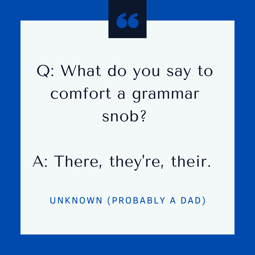 Meanings and Examples
Meanings and Examples
Read this 5-minute grammar lesson and never doubt your spelling or use of “they’re,” “their,” or “there” again.
They’re: Meaning and Examples
If you understand the basics, you’re less likely to forget information. The most basic information about “they’re” is that it’s a contraction. When you see an apostrophe (this little fella: ’) between multiple letters in nonplural words, it’s a big, red, bouncy alert: Two or more words have been smushed together, and at least one letter/sound has been left out. These combo words are called contractions.
Contraction examples:
- they’ll: they will
- can’t: can not
- wouldn’t: would not
- she’s: she is
- isn’t: is not
- must’ve: must have
- didn’t: didn’t
- aren’t: are not
- ’twasn’t: it was not (don’t use this unless you’re trying to write 18th-century-vibes poetry)
Apostrophes are also used to show possession (ownership) and for clarity in a few oddball plurals.
“They’re” is a contraction of “they are.” We use it to talk about an ungendered person or a group of two or more people, as in these examples:
- They’re angry because I sat down on the birthday cake.
- I invited Bob and Rayshawn, but they’re too busy making a new cake to come.
- If they’re going to the hoedown after school, can I go too?
- I know they’re small, but these potatoes are super tasty!
Tip: Any time you see “they’re,” remember what the apostrophe is telling you—this is a combo word. Pull it apart in your brain: “they” and “are.” Or put it back together (squish).
Their: Meaning and Examples
Back to the basics again. “Their” is a pronoun.* Pronouns are words we use as replacements for proper nouns. Instead of talking about my friend Ryan using only his name over and over (how annoying would that be?), I use “he” sometimes. And if I’m talking about something being done or given to Ryan, I use “him.”
There are many different types of pronouns, but all we’ll focus on right now are general possessive pronouns. These are replacement words we use to talk about ownership.
Possessive pronoun examples:
- Her dog ate the cake I sat on.
- The dog got sick in its bed after eating so much cake.
- “Hey, that cake wasn’t even mine!” I yelled.
- “It wasn’t ours either,” she and her husband yelled back.
- “The birthday cake was his,” my mom said, pointing to the neighbors’ parrot.
- “Go apologize to the birthday bird!” she told their dog.
“Their” is the possessive form of “they.” So anytime “they” (whoever “they” are) own something, we’re going to use “their” to refer to it:
- I went over to their house last Friday.
- They never give their children cake after the sad “cake-smushing/eaten by a dog” incident.
- I heard the bird owners also talked to their attorney about pressing charges.
- They said their hearts and their bird’s heart were forever broken by the destruction of the birthday cake.
Tip: If you’re talking or writing about something that belongs to somebody, use “eir.”
There: Meaning and Examples
“There” has a lot of different jobs that express slightly different meanings.
- As an adverb: She stood there waiting for cake even after we told her the dog ate it.
- As a pronoun: Hi there!
- As a noun: Once you finish the report, she’ll take it from there.
- As an adjective: I’ll be there for you, no matter what.
Guess what? You don’t need to know why “there” is a different type of word in each sentence above. You’ll still be able to use it correctly by simply tossing all the different uses of “there” into a bucket labeled “a place.” You’ll intuitively know the more specific meaning as you use this word, since you already know how to speak English.
- “I don’t want to go there!” she squealed.
- There’s a sad birthday bird over there.
- “There, there,” she cooed, stroking the bird’s head.
- “I want cake,” the bird said, “and there’s nothing else that will make me happy.”
The third example is the only one that widely varies from the “place” meaning, but since you already know we’re not talking about “they are” or ownership, it’s easy to know “there” is correct.
Tip: If it’s “a place” or not possessive, use “ere.”
Practice
Your turn! Fill in the missing words with “they’re,” “their,” or “there.” Answers are listed below the graphic.
- ___________ dog is named Kevin.
- Kevin is right over ___________.
- I love Kevin and all other dogs because ____________ such happy little slobber balls.
- I asked Mom and Dad for ___________ debit card to buy snacks, but they told me to get a job.
- ____________ is only one job I want—to be a dogwalker.
- I asked my neighbors, but ___________ already happy with their dogwalker. Dang it!
Do you have any more questions about these three similar words? Post them in the comments below, and we’ll be sure to answer them!
*Grammar afficionados will recognize this statement is not entirely accurate in that “their” is a possessive adjective. For the sake of brevity, simplicity, and not driving the average person to hate grammar more than they already do, we have presented the information in this less-precise manner.
Answers:
- Their
- There
- They’re
- Their
- There
- They’re




